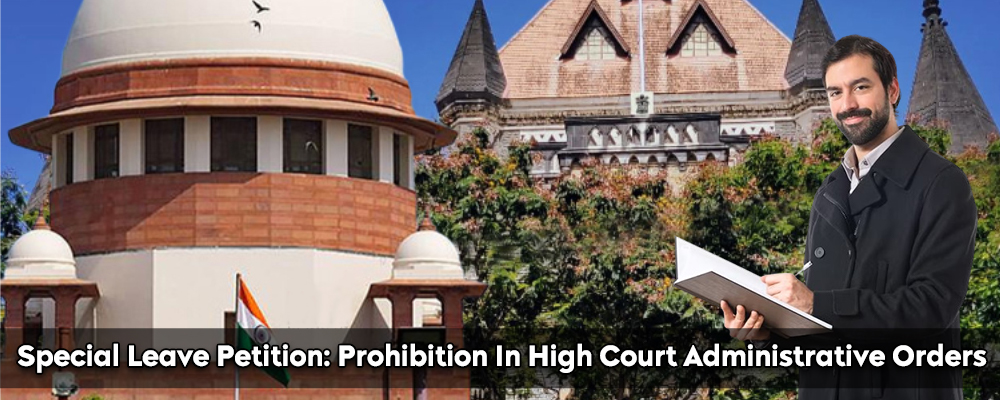In a historic decision, the Supreme Court of India defined a significant area of jurisdiction by ruling that an administrative High Court order cannot be challenged through the filing of a Special Leave Petition (SLP). This ruling has significant ramifications for the legal system and calls for a closer look at the judicial review process and the division of powers.
Need A Legal Advice
The internet is not a lawyer and neither are you. Talk to a real lawyer about your legal issue

Special Leave Petitions: About
- Article 136 of the Indian Constitution grants the Supreme Court of India extraordinary jurisdiction. This Article gives the court the authority to give special permission for an appeal from any judgment, decree, resolution, sentence, or order rendered by any court or tribunal operating within the borders of India, in any cause or case.
- As opposed to other Articles that specify that an appeal may only be made from a judgment, decree, or final order, this Article has no restrictions. Leave to Appeal is allowed even from temporary orders.
Scope of Special Leave Petitions
- Special Leave Petitions (SLPs) serve as a unique mechanism in the Indian legal system, allowing litigants to seek the Supreme Court’s discretionary jurisdiction to appeal against orders of lower courts.
- However, the recent judgment underscores that this recourse is not available when challenging orders issued by High Courts on the administrative side. This limitation highlights the need for a nuanced understanding of the separation of powers between the judiciary and the administrative functions of the High Courts.
Separation of Powers
- The Indian constitutional system is firmly rooted in the idea of the separation of powers, which works to prevent power from being concentrated in the hands of one branch of government.
- The judiciary, which is charged with upholding justice and interpreting the law, needs to strike a careful balance with the High Courts’ administrative duties. Determining the limits between judicial and administrative proceedings has become increasingly important over time in order to preserve the values of justice and fairness.
Rationale of the Supreme Court
- The Supreme Court’s recent ruling reiterates that the jurisdiction to entertain SLPs is limited to decisions made by High Courts in their judicial capacity.
- The court emphasized that matters falling under the administrative domain, such as appointments, transfers, or disciplinary actions, do not fall within the purview of SLPs.
- The rationale behind this limitation is grounded in the idea that administrative orders are distinct from judicial determinations and should be subject to alternative legal remedies.
Judicial Review: Its Impact
- The decision has implications for the scope of judicial review in India. While the judiciary plays a crucial role in upholding constitutional values, the delineation between judicial and administrative functions is vital.
- Restricting the filing of SLPs in administrative matters reinforces the principle that specialized forums, such as tribunals or statutory bodies, should be the primary avenue for addressing grievances arising from administrative actions.
Administrative Law and Alternative Remedies
- This decision accentuates the significance of administrative law in India. Litigants aggrieved by administrative orders of High Courts must resort to alternative remedies available within the administrative and statutory frameworks.
- This not only ensures the proper functioning of the separation of powers but also contributes to the efficiency and effectiveness of the legal system.
Challenges and Criticisms
- While the Supreme Court’s decision provides clarity on the limited scope of SLPs, it has faced criticism on several fronts.
- Some argue that this demarcation might lead to jurisdictional gaps, leaving litigants without an effective remedy in certain situations.
- The challenge lies in striking a balance between the need for streamlined procedures and the overarching objective of justice.
The decision by the Supreme Court that Special Leave Petitions cannot be used to appeal administrative orders made by High Courts represents a major shift in Indian jurisprudence. It emphasizes how crucial it is to uphold the division of powers and instructs litigants to look into alternate avenues for resolving administrative complaints. Upholding the principles of justice whilst negotiating the complex interplay between judicial as well as administrative functions is crucial as the legal landscape changes.
One can talk to lawyers from Lead India for any kind of legal support. In India, free legal advice online can be obtained at Lead India. Along with receiving free legal advice online, one can also ask questions to the experts online free through Lead India.



